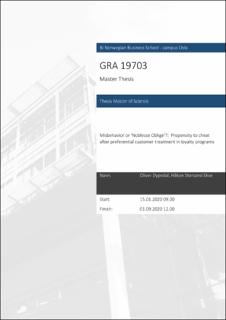| dc.contributor.author | Dypedal, Oliver | |
| dc.contributor.author | Ekse, Håkon Storsand | |
| dc.date.accessioned | 2020-11-11T08:26:34Z | |
| dc.date.available | 2020-11-11T08:26:34Z | |
| dc.date.issued | 2020 | |
| dc.identifier.uri | https://hdl.handle.net/11250/2687249 | |
| dc.description | Masteroppgave(MSc) in Master of Science in Strategic Marketing Management - Handelshøyskolen BI, 2020 | en_US |
| dc.description.abstract | This paper is centered around preferential treatment in loyalty programs, and how
it affects the customers’ probability to engage in fraudulent behavior. Through an
experimental survey this paper intended to provide evidence that belonging to a
particular status group causes differences in the customers’ probability of
engaging in fraudulent behavior. It was hypothesized that elevated status would
cause the customers to either misbehave or lead to a phenomenon known as
noblesse oblige. Although the current paper found no evidence for elevated status
alone causing these differences, it provides evidence for the effect of elevated
status on probability of engaging in fraudulent behavior being mediated by
perceptions of superiority. Additionally, the current paper identifies the
moderating role of potential gain (in this case; size of mistake) in the relationship
between elevated status and probability of engaging in fraudulent behavior. The
results imply that managers should focus on providing their gold or silver status
customers with preferential treatment that makes the customer perceive
themselves as more superior, as this seems to cause noblesse oblige effects. | en_US |
| dc.language.iso | eng | en_US |
| dc.publisher | Handelshøyskolen BI | en_US |
| dc.subject | markedsføringsledelse | en_US |
| dc.subject | marketing management | en_US |
| dc.subject | strategisk | en_US |
| dc.subject | strategic | en_US |
| dc.title | Misbehavior or ‘Noblesse Oblige’?: Propensity to cheat after preferential customer treatment in loyalty programs | en_US |
| dc.type | Master thesis | en_US |
